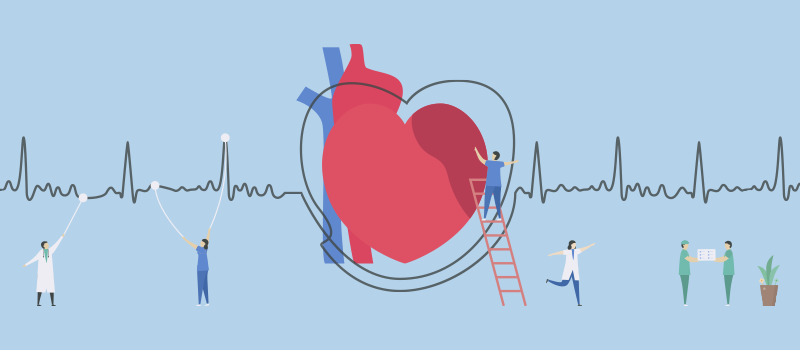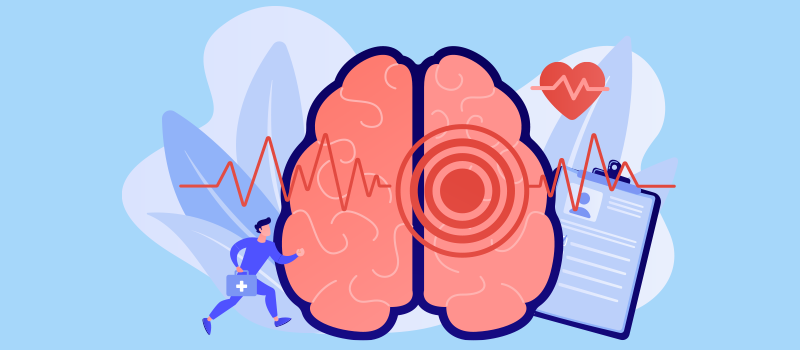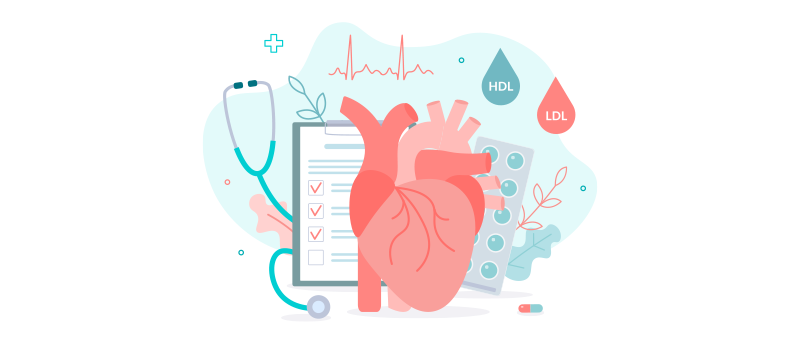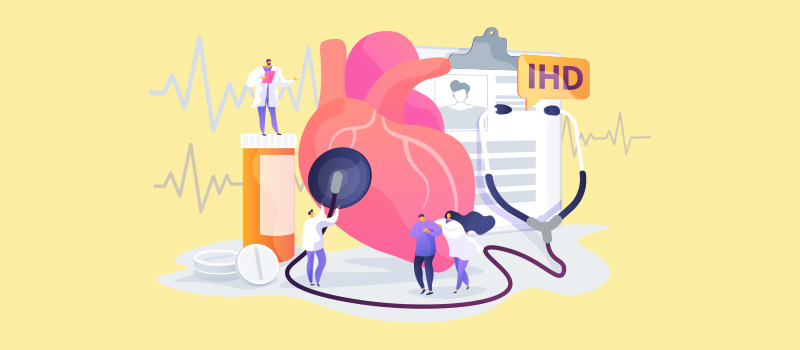What’s the Buzz
The Bee Healthy Blog
Medications Most Commonly Prescribed for Cardiovascular Disease

Did you know that cardiovascular disease is a leading cause of death among Americans? Some 20 million Americans are living with coronary artery disease. According to the CDC, about 805,000 Americans have a heart attack each year. One person dies every 34 seconds in the US from heart disease, and it is responsible for 1 in 5 deaths based on the 2020 data of 679,000 deaths caused by cardiovascular disease.
The numbers are mind-boggling. But the good news is that heart disease is treatable and preventable in many cases. Several classes of drugs are available to treat high blood pressure, abnormal heart rhythms, and heart failure. Doctors can use cardiac medications to prevent blood clots, reducing the heart’s workload and thus preventing future heart attacks or slowing down the progression of heart failure.
Please continue reading to learn more about some commonly prescribed heart medications.
Anticoagulants
What they do: Anticoagulants (also called blood thinners) decrease the clotting ability (coagulability) of blood. Therefore, they help prevent new blood clots from forming, and even though they do not dissolve existing clots, anticoagulants keep them from getting bigger.
Uses: A blood clot can block the coronary arteries - these are the blood vessels that supply blood to the heart muscle; this, in turn, will severely reduce or stop the blood flow to the heart, leading to a heart attack. Similarly, a stroke happens when clots get into the blood vessels supplying blood flow to the brain. Anticoagulants are prescribed to treat and prevent heart attack or stroke in hospitals and at home post-hospital discharge. Anticoagulants help reduce the risks of severe complications in the future by preventing existing blood clots from becoming bigger.
Examples: Heparin, warfarin (Coumadin), rivaroxaban (Xarelto), apixaban (Eliquis), dabigatran (Pradaxa).
Antiplatelet Agents
What they do: An antiplatelet agent works by preventing blood platelets from sticking together. This helps prevent blood clots from forming.
Uses: Antiplatelet agents are used to prevent blood clots in patients with heart attack, ischemic stroke, unstable angina, transient ischemic attacks (TIAs), and other cardiovascular diseases. These medicines can also be used prophylactically if a person is at high risk for developing a major blockage in the artery.
Examples: Aspirin, clopidogrel (Plavix), ticagrelor (Brilinta), prasugrel (Effient), dipyridamole (Persantine).
Angiotensin Converting Enzyme (ACE) Inhibitors
What they do: ACE inhibitors relax blood vessels and make blood flow smoother. They lower blood pressure and reduce the heart’s workload.
Uses: ACE inhibitors are prescribed to patients with high blood pressure and heart failure.
Examples: Enalapril (Vasotec), benazepril (Lotensin), lisinopril (Zestril, Prinivil), captopril (Capoten), quinapril (Accupril), moexipril (Univasc), fosinopril (Monopril), trandolapril (Mavik, perindopril (Aceon), ramipril (Altace).
Angiotensin II Receptor Blockers (ARBs)
What they do: Angiotensin receptor blockers block a chemical called angiotensin II, which causes narrow blood vessels. Therefore, these medicines relax the blood vessels and make blood flow easier, lowering blood pressure.
Uses: ARBs are used to treat high blood pressure and heart failure.
Examples: Valsartan (Diovan), candesartan (Atacand), telmisartan (Micardis), losartan (Cozaar), eprosartan (Teveten), olmesartan (Benicar), azilsartan (Edarbi), irbesartan (Avapro).
Beta Blockers
What they do: Beta-adrenergic blocking agents or beta-blockers work by decreasing the heart rate and force of the heart’s contractions which, in turn, lower blood pressure and heart rate while reducing the heart’s workload.
Uses: Beta blockers are prescribed to patients with high blood pressure, atrial fibrillation or AFib (irregular heartbeat), and chest pain (angina). They are also used to prevent heart attacks in the future in patients who have already had a heart attack.
Examples: Atenolol (Tenormin), bisoprolol (Zebeta), acebutolol (Sectral), metoprolol (Toprol XL, Lopressor), propranolol (Inderal), betaxolol (Kerlone), nadolol (Corgard), sotalol (Betapace).
Calcium Channel Blockers
What they do: Calcium blockers relax the blood vessels and reduce the heart’s pumping strength.
Uses: These medicines are used for high blood pressure, chest pain (angina), and some types of abnormal heart rhythms such as atrial fibrillation.
Examples: Diltiazem (Tiazac, Cardizem), amlodipine (Norvasc), nifedipine (Procardia, Adalat), felodipine (Plendil), verapamil (Verelan, Calan), nisoldipine (Sular), and nimodipine (Nimotop).
Cholesterol Lowering Medications
What they do: These heart medicines include statins and a cholesterol absorption inhibitor. They lower LDL (bad cholesterol) and triglyceride levels; some of these medications can also raise HDL (the good cholesterol) at a certain dosage.
Uses: Cholesterol-lowering medications help reduce the risk of heart attack or stroke by preventing the buildup of plaque in the coronary arteries.
Examples: Statins like atorvastatin (Lipitor), pravastatin (Pravachol), simvastatin (Zocor), rosuvastatin (Crestor), lovastatin (Mevacor), fluvastatin (Lescol), and pitavastatin (Livalo); cholesterol absorption inhibitor like ezetimibe (Zetia); combination drug therapy like Vytorin (ezetimibe/simvastatin); and Niacin, a nicotinic acid.
Digitalis
What it does: Digitalis causes the heart to beat with less force.
Uses: It is used to treat irregular heartbeats and alleviate heart failure symptoms if there is an inadequate response to ACE inhibitors, ARBs, and diuretics.
Example: Digoxin (Lanoxin).
Diuretics (Water Pills)
What they do: Diuretics remove fluid from the body through urination and reduce the heart’s workload.
Uses: Different diuretics work by different methods. In general, a diuretic lowers blood pressure and reduces swelling caused by fluid build-up in the lungs and lower extremities (legs and ankles).
Examples: Furosemide (Lasix), hydrochlorothiazide (Hydrodiuril, Esidrix), amiloride (Midamor), chlorothiazide (Diuril), acetazolamide (Diamox), bumetanide (Bumex), chlorthalidone (Hygroton), indapamide (Lozol), spironolactone (Aldactone), metolazone (Zaroxolyn), torsemide (Demadex).
Wrapping Up
These are just some common medicines used to treat heart disease and reduce the risk of heart attack or stroke.
It is important to be evaluated by your healthcare provider for risk factors of heart disease. Your doctor will develop a treatment plan to reduce your risk, including lifestyle changes and heart medications.
Like all medicines, heart medicines carry certain risks. For example, aspirin therapy and blood thinners can help prevent blood clots from forming, but they can increase bleeding risk. Always take the prescribed medication exactly as directed by your healthcare provider. Also, talk to your doctor about the possible side effects of your medications, what to watch out for, and when to contact a healthcare professional.
References:












SOCIAL